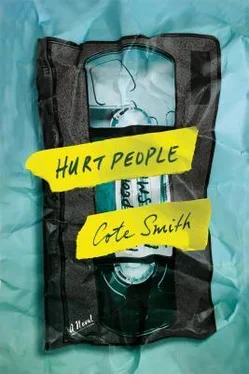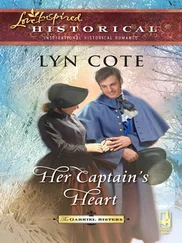Someone grabbed me from behind. They wrapped their arms around my waist. I knew who it was right away. I knew her arms by heart, but I still tried to swing the bat. Easy, she said. Baby boy, easy. It’s just a test. She let me go. What are you doing? she said. What’s wrong? I didn’t turn around. She waited a second. She said, Where is your brother?
I faced her. She was on her knees, on my level, with her big blond hair, her worn-down eyes.
“Where is he?” she said. “Is he in the laundry room?” I looked at her shoes. She put her hand to my chest. “You can tell me. You don’t have to protect him.”
I kept my head down. I thought this might make things easier, but my eyes still became blurry.
“Hey,” she said. The siren stopped. “Hey.”
The scream dissolved into one long low note, like someone dying in slow motion.
“Look at me,” my mother said. “One last time. Where is your brother?”
I turned toward our window, toward the woods. I bit my thumb and thought of the silo. “He’s gone,” I said. “He took him.”
I STAYED IN MY ROOM, the door shut and the lights off, but I could hear everything. The warble in my mother’s voice when my dad picked up and she said his name. The ticking of our clock as she steadied herself and told him what happened. I heard the sobs that followed. I heard all these things in part because our apartment was quiet. There were no neighbors knocking around, no working A/C units sputtering on and off. But also because I had my eyes closed, which I knew for sure made me hear better.
When I opened my eyes, the room’s dark was different. I had fallen asleep. I didn’t know for how long. I had not dreamt.
There was someone sitting at the end of my bed, facing away from me. A slender, fit body. At first I thought it was my brother, returned to me once again. Maybe he had escaped after all. Maybe he knew a secret spot in the woods, more secret than the silo. Maybe he had gone there, waited until the coast was clear, and simply strolled home.
“Hi, son,” my dad said.
I sat up and leaned on his shoulder. He put his arm around me, like we were back at his place watching a bad movie. I put my head against his chest and felt the cold metal of his badge. He was in uniform.
“This will be hard,” he said. “But I need you to help me. I need you to tell me everything about the man who took your brother.” His gun, holstered on his side, dug into my hip. Why aren’t you out there right now? I thought. You should be out there, looking for him. We both should be.
“I’ve got officers in the woods,” he said, as if he knew exactly what I was thinking. “But you know how big those woods are. And soon it’ll be dark.”
He was right. I could see that through the window. The clouds had moved on, and the sun was still high in the sky, but so was the moon. Pink was peeking through the blue.
“Come on,” he said, “let’s go sit at the table. You can tell us all about it.”
He took my hand and walked me to the kitchen, where my mother was sitting at the square table, her head in her hands.
“Aggie,” my dad said.
My mother raised her head, showed me her red face. She pulled out a chair. “I made you some cereal,” she said, sniffling.
I sat down and spooned the cereal. All the best bits were soggy; they had drowned waiting for me. My dad sat on the other side and opened his notepad.
“Tell us everything,” he said. “Everything you ever saw. Everything that was ever said.”
I could hear the desperation in his voice, the same panic that was on my mother’s face, and that laced the air around us.
“Son,” my dad said, “please. You have to help me.”
* * *
I started at the beginning. I put in every detail I could think of. The tattoo. The trunks. The Gainer. I said his name was Chris, but then it wasn’t. I took my time and chose my words carefully. I imagined I was my brother and tried to tell the story as if I were him. When I was done, my mother looked at me like I had fired acorns at every squirrel in our complex, until they all fell dead at the feet of their trees. My dad shook his head and said mercy. Mercy, he said. Over and over. He thanked me and told me to go to my room so he and my mother could talk. I nodded and left the kitchen, but didn’t go into my room. I shut the door to fool them, and snuck back and spied from the hallway. I needed to hear them list what all I had done wrong. How I should have told them about Chris when my dad asked. How I should have stayed out of the woods. How I never should have left my brother alone.
“I have to go,” my dad said. “I’ve got Tony and Alan in the woods, but that’s all I got.”
My mother said my dad’s name. “You have to find him,” she said. “He can’t be out there like that. With that man.”
I peeked around the hall wall, just enough to see my dad put his hand to my mother’s hair. “I will bring him back,” he said.
My mother nodded. She said she wanted to go with my dad. She said all the things victims said in those bad movies we’d seen, the words that before never meant a thing.
My dad went to the door but stopped in the dark hall. “Aggie,” he said. “I’m sorry.”
“I know.”
“No, I mean, you shouldn’t be alone in this place, in this city. I never should have left.”
My mother came out of the kitchen. But she didn’t go to my dad. She went to the sliding glass door and stared at the woods. “I know,” she said. “I know what you meant.”
* * *
I found my mom standing at the glass door, still in her club shirt from work. She hadn’t moved. The TV was on but the sound was off. A weatherman was pointing at various red blobs moving across the squares and rectangles that represented our corner of the state.
“This is bad,” my mother said. “This is real bad.” A few fat drops hit the glass. I put my arms around her and rested my head on her side. “I don’t know whose fault this is,” she said. “Whose fault is this?”
I knew I wasn’t supposed to say anything, so I just squeezed my mother tighter. Her shirt smelled like sweat and club cleaner. The sky flashed and there was a quick pop, like a bulb had gone out. Little time between light and sound. My mother pushed me away from the glass. “The storm is close,” she said. “We better watch the weather.”
We sat on the couch and my mother put her arm around me. The weatherman zoomed in on our square. He pointed to the solid red mass southwest of us. He fast-forwarded the image behind him, showing us what our county would look like in a matter of minutes. What he showed was that our county wasn’t there. In its place was the red mass. The weatherman was doing his best to warn everyone. His gestures grew wilder, his eyes wider. But my mother and I couldn’t make ourselves care. We sat on the couch and knew whatever was happening out there, whatever was coming our way, was going to happen, and that nothing we could do would make it stop. All we could do was wait.
* * *
I woke up because someone was shaking me. I opened my eyes but it was as if I kept them closed. All the lights were out. The city’s siren blared.
“Come on, we have to go,” my mother was saying. I was still on the couch. She struck a match and lit a candle. “This isn’t a test.”
She got me on my feet and led me to the door. The siren was louder out in the hallway, bouncing off our building’s empty halls, the empty bedrooms. I couldn’t see anything except my mother’s worried face, yellow in the candle’s glow.
The laundry room was humid and reeked of bleach. We were the only two down here. My mother pointed to a spot by a dryer. She didn’t have to tell me what to do next. We had practiced this drill many times in school. An alarm would sound and the teacher would jump at her desk, drop her chalk, and lead us away from the classroom windows and into the hall. We would line up against the wall and they would tell us to get down on our knees. Ball up. Put your face between your legs and cover your head. They called it the fetal position, but none of us knew what that meant, unless we had an older brother who was smart and would tell us if we asked nicely. Still, we did what the teachers said. We huddled until our knees hurt from the tile, until we grew tired of tasting our breath. When the drill was over and we were all back in the classroom, rubbing our necks and complaining, the teacher would say she was sorry. Some tornadoes like to take their time. But it’s for your own good. In this part of the country, a drill like this can save your life.
Читать дальше












